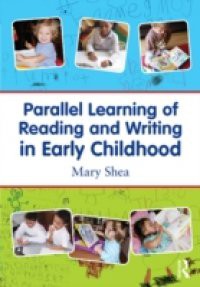Parallel Learning of Reading and Writing in Early Childhood explores why it's important to provide a balanced language learning environment for young children and offers approaches for children to practice and explore language. Writing - a different but parallel process - can open the door to reading, and an effective writing approach in the home and early childhood classrooms leads to the development of phonemic awareness, understanding of phonetic principles, vocabulary, fluency, and comprehension. Effective early childhood teachers are those that extend the knowledge children have amassed at home and use the knowledge of how children learn naturally in the world to inform their practice. This book offers the purpose, context, and outcomes of including writing right from the start in young children's literacy learning. Through analysis of writing samples, research, and principles of best practices, Shea outlines the essential ingredients for early language learning and provides a developmentally appropriate approach to language learning. Throughout the chapters, Shea integrates discussion of assessment, classroom environment, instructional/teacher scaffolding, and differentiating instruction across developmental levels along with the supporting theory.Special features:vignettes and descriptions of Pre-K, K, and Grade 1 classrooms that incorporate writing across the dayartifacts of children's writing that demonstrate an evolution of knowledge related to both message and word constructionconcept labeling words and topic specific terms defined throughout the book to support the reader's understanding of professional terminology discussion of seminal and current research as well as best practicesCompanion Website with lesson ideas and abundant writing samples from a wide range of demographic, cultural, and language contexts for readers to view, analyze, and discuss. This text offers pre- and in-service early childhood education teachers the content and resources to develop a deeper understanding of language learning, to prompt an examination of current practice, and to stimulate curricular re-designs that foster meaningful, joyful, and motivated learning.

